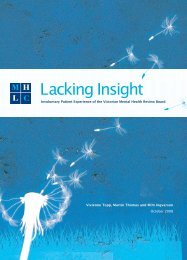Reducing Ethnic Profiling in the European Union - Open Society ...
Reducing Ethnic Profiling in the European Union - Open Society ...
Reducing Ethnic Profiling in the European Union - Open Society ...
- No tags were found...
You also want an ePaper? Increase the reach of your titles
YUMPU automatically turns print PDFs into web optimized ePapers that Google loves.
Covenant rights that are especially relevant to ethnic profil<strong>in</strong>g <strong>in</strong>clude “<strong>the</strong> rightto liberty and security of <strong>the</strong> person,” which <strong>in</strong>cludes freedom from “arbitrary arrestor detention” (Article 9(1)) and <strong>the</strong> right to “be equal before <strong>the</strong> courts and tribunals”(Article 14(1)).Article 1 of <strong>the</strong> International Convention on <strong>the</strong> Elim<strong>in</strong>ation of All Forms ofRacial Discrim<strong>in</strong>ation, 250 (“Race Convention”), provides: “In this Convention, <strong>the</strong> term‘racial discrim<strong>in</strong>ation’ shall mean any dist<strong>in</strong>ction, exclusion, restriction or preferencebased on race, colour, descent, or national or ethnic orig<strong>in</strong> which has <strong>the</strong> purpose oreffect of nullify<strong>in</strong>g or impair<strong>in</strong>g <strong>the</strong> recognition, enjoyment or exercise, on an equalfoot<strong>in</strong>g, of human rights and fundamental freedoms <strong>in</strong> <strong>the</strong> political, economic, social,cultural or any o<strong>the</strong>r field of public life.” The Race Convention requires States partiesto ensure non-discrim<strong>in</strong>ation <strong>in</strong> <strong>the</strong> enjoyment of enumerated rights, <strong>in</strong>clud<strong>in</strong>g twothat are often implicated by <strong>the</strong> police practices addressed <strong>in</strong> this report: “freedom ofmovement” (Article 5(d)(i)) and <strong>the</strong> “right to equal treatment before <strong>the</strong> tribunals andall o<strong>the</strong>r organs adm<strong>in</strong>ister<strong>in</strong>g justice” (Article 5(a))EU Regional Standards and Case LawTurn<strong>in</strong>g to <strong>European</strong> norms, Article 14 of <strong>the</strong> <strong>European</strong> Convention on Human Rights(ECHR) prohibits discrim<strong>in</strong>ation <strong>in</strong> <strong>the</strong> enjoyment of rights protected by <strong>the</strong> convention.251 ECHR rights that are particularly relevant to <strong>the</strong> practices addressed <strong>in</strong> thisreport <strong>in</strong>clude <strong>the</strong> rights to liberty and security of <strong>the</strong> person (Article 5(1)) and fair trialrights associated with “<strong>the</strong> determ<strong>in</strong>ation of [an <strong>in</strong>dividual’s] civil rights” and of “anycrim<strong>in</strong>al charge aga<strong>in</strong>st him” (Article 6(1)). <strong>Ethnic</strong> profil<strong>in</strong>g <strong>in</strong> its various forms alsotouches upon <strong>in</strong>dividuals’ right to respect for <strong>the</strong>ir privacy, family life, correspondenceand home (Article 8); freedom of religion (Article 9) and assembly (Article 11); andfreedom of movement (Article 2, Protocol No. 4).Protocol No. 12 broadens <strong>the</strong> <strong>European</strong> Convention’s protections aga<strong>in</strong>st discrim<strong>in</strong>ationby, among o<strong>the</strong>r th<strong>in</strong>gs, prohibit<strong>in</strong>g discrim<strong>in</strong>ation on any ground <strong>in</strong> respect ofany right set forth <strong>in</strong> national law “by any public authority” (Article 1). 252 The ExplanatoryReport to Protocol No. 12 makes clear that this prohibition applies to discrim<strong>in</strong>ation “bya public authority <strong>in</strong> <strong>the</strong> exercise of discretionary power,” 253 which would <strong>in</strong>clude identitychecks, stops and searches, and surveillance activities by law enforcement officers.While <strong>the</strong> legal norm aga<strong>in</strong>st discrim<strong>in</strong>ation is universal and fundamental, notall dist<strong>in</strong>ctions or differences <strong>in</strong> treatment by public authorities, <strong>in</strong>clud<strong>in</strong>g law-enforcementpersonnel, constitute discrim<strong>in</strong>ation. The <strong>European</strong> Court of Human Rights hasruled that: “A differential treatment of persons <strong>in</strong> relevant, similar situations, withoutan objective and reasonable justification, constitutes discrim<strong>in</strong>ation.” 254192 APPENDIX B: LEGAL STANDARDS AND CASE LAW
















